Vidya Bhawan Govindram Seksaria Teacher college
Affiliated to Mohanlal Sukhadia University, Udaipur (Rajasthan)
Recognized by National Council for Teacher Education (NCTE), New Delhi
Vidya Bhawan G.S. Teachers college Udaipur founded in1942 is one of the Institutes of Vidya Bhawan Society, an association registered under the Mewar Societies Registration Act No. VII of 1941. Its foundation stone was laid on 3rd October, 1942 by Sir Mirza Ismail, the then Prime Minister of Jaipur State.
Initially, this teachers college took up the training of teachers for the certificate of teaching which continued for six years i.e. from 1942 to 1948. During this period, it was affiliated to the Board of High School and Intermediate Education, Rajputana (including Ajmer-Merwar), Central India and Gwalior, University of Rajasthan (Formely Rajputana). M.Ed. course was started in 1951. Doctoral Programme was added later on and the first Ph.D. Degree was awarded in 1963.
Since the session 1964-65, the college has been preparing candidates for B.Ed., M.Ed. and Ph.D. degrees. Diploma in Early Childhood Education (Dip. E. C. Ed.)1969.
In the year 1993 the college was upgraded to an Institute of Advanced Studies in Education (CTE) under the scheme of qualitative improvement of Teacher Education as envisaged in the National Policy on Education, 1986. Presently the Institute is affiliated to Mohan Lal Sukhadia University, Udaipur (Rajasthan).
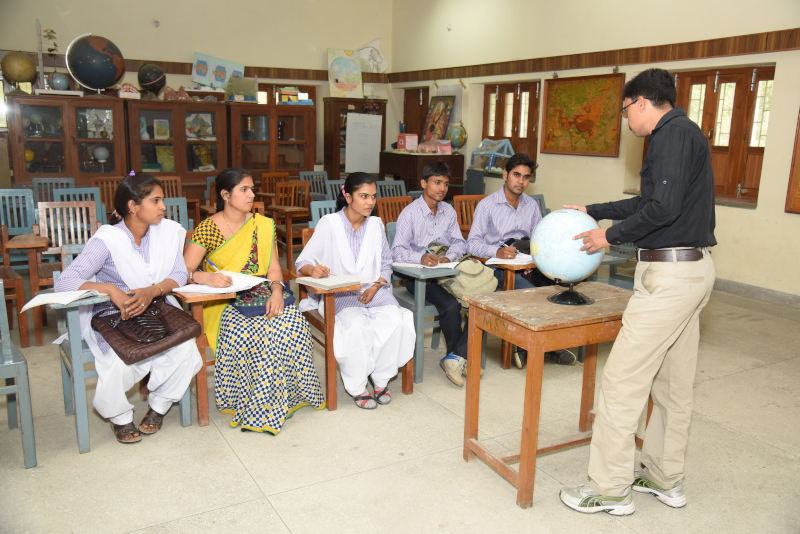
Vidya Bhawan was founded in 1931 by an eminent educationist Dr. Mohan Sinha Mehta, one of the pioneers in the field of progressive education in India. It was some time in 1926-1927 that Dr. Mehta had conceived the idea of a new school for transformation and reconstruction of Indian society. It is with this goal that the foundation of Vidya Bhawan School was laid in July 1931.
During the period of consolidation of the Vidya Bhawan School, Dr. Mehta simultaneously visualized the role of teachers in achieving the desired goals. As a result of this Vidya Bhawan G.S.Teachers College was started in 1942. It was the first teachers training college in Rajasthan. Dr. Mehta’s close associate Dr. K.L.Shrimali,who later became Education Minister, Govt. of India, was the first principal of this college.
Vidya Bhawan G.S. Teachers college Udaipur founded in1942 is one of the Institutes of Vidya Bhawan Society, an association registered under the Mewar Societies Registration Act No. VII of 1941. Its foundation stone was laid on 3rd October, 1942 by Sir Mirza Ismail, the then Prime Minister of Jaipur State.
Initially, this teachers college took up the training of teachers for the certificate of teaching which continued for six years i.e. from 1942 to 1948. During this period, it was affiliated to the Board of High School and Intermediate Education, Rajputana (including Ajmer-Merwar), Central India and Gwalior, University of Rajasthan (Formely Rajputana). M.Ed. course was started in 1951. Doctoral Programme was added later on and the first Ph.D. Degree was awarded in 1963.
Since the session 1964-65, the college has been preparing candidates for B.Ed., M.Ed. and Ph.D. degrees. Diploma in Early Childhood Education (Dip. E. C. Ed.)1969.
In the year 1993 the college was upgraded to an Institute of Advanced Studies in Education (CTE) under the scheme of qualitative improvement of Teacher Education as envisaged in the National Policy on Education, 1986. Presently the Institute is affiliated to Mohan Lal Sukhadia University, Udaipur (Rajasthan).
Vision
“Teacher Education for Excellence & Sustainable Future”
Mission
- To prepare Quality Teacher Educators, Educational Professional and Researchers and work for above all as Learning Centre.
- To prepare Teachers for Sr. Secondary, Secondary, Elementary and Pre-School Levels.
- To initiate Innovations in the area of Education in general and Teacher Education in particular.
- To function as Centre of Research in Education.
Principal's Desk
Vidya Bhawan Govind Ram Seksaria Teachers college is one of the pioneer teacher education institution in the country founded by the great visionary late Dr Mohan Singh Mehta in the year 1942. The college is well known for its contribution in the areas of innovations and experiments in teaching and research in the world of teacher education. This feature had put this institution in the list of leading colleges of education in India.
This college has the honour to be recognized by MHRD as it was given the status of IASE under a centrally sponsored scheme, in the year 1995 and later on as CTE in the year 2007.
After up-graduation the college enlarged its functions and included additional academic responsibility of organizing in-service teacher education programmes for headmasters and teachers of secondary schools of seven districts located in Southern Rajasthan, along with organizing Pre-service Teacher Education Programme, which include B.Ed. and M.Ed. courses and also offer PhD in education. It is the pioneer institution to start P.G. and PhD courses in education in the state of Rajasthan.
In the light of new developments and demands, the core issues like development of new Teaching Skills, Classroom Management, Leadership, Sensitivity towards community, Research orientation etc. are at the priority and form important features of this institute to produce worthy and dynamic teachers who can contribute well to the progress of the nation and the world at large. Along with essential academic inputs. Thrust is also given to achieve purity of thought, word and deed through self-discipline participation in co-curricular programmes and outdoor activities aiming at personality development, around the year.
The focus in the entire curriculum transaction process helps the in-service and prospective teachers to understand the process of education and their role in managing quality education in the educational organization in the light of changing global demands.
The college was also accreditated as an ‘A’ grade institution by NAAC in the year 2008.
The college is undergoing the process of Re-Accreditation by NAAC.
With best wishes.
Dr Farzana Irfan
Principal
V.B.G.S.T.C., Udaipur (Raj.)
Objectives of the Institute
The main objectives of the Vidya Bhawan CTE are:-
- Imparting quality pre-service education through B.Ed., M.Ed., Ph.D. Programmes and also quality in-service education.
- Preparing personnel for the faculties of elementary and secondary teacher education Institutions, and their continuing education.
- Providing general resource support to the secondary schools and elementary teacher education Institutions
- Conducting research, innovations and extension work in the field of secondary education and elementary teacher education.
Administration structure of Vidya Bhawan Society
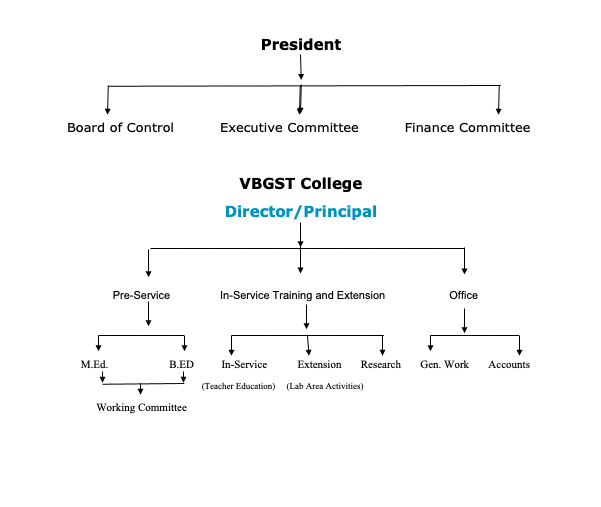
Salient Features of VBRI
- Excellent results.
- Fee relaxation to meritorious students.
- Scholarships to SC/ST/Minority and OBC.
- English and Hindi medium teaching facility.
- Hostel facility.
- Well Equipped Laboratories.
- Hi-tech library.
- Sports facilities and vast playgrounds.
- Gymnasium.
- Eco-friendly environment.
- Co-education.
- Placement Cell.
About Vidya Bhawan
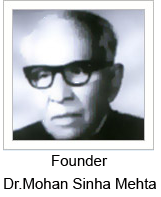
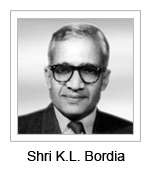
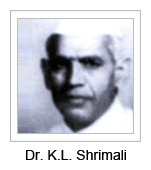

Vidya Bhawan was founded by Dr. Mohan Sinha Mehta along with his close associates Dr. K.L. Shrimali and Shri K.L. Bordia in 1931. Ahead of its time, Vidya Bhawan was modeled on the principles of Boy Scout Movement, incorporating the Gandhian ideals of Basic Education. As opposed to the feudalistic society, the objective was to provide uncommon education to common children. The aim was to build a responsible citizenry capable of serving and transforming society.
Originally started as a modest effort, Vidya Bhawan has flourished into a bouquet of over a dozen institutions committed to quality and excellence in the field of education.
Shri Ajay S. Mehta is the President of Vidya Bhawan Society. He did his B.A. from Yale University and his M.Phil. in Economics from J.N.U. He worked in the Indian Railway Traffic Service from 1980-1984. Since then he has been associated with the voluntary sector.
Vidya Bhawan Society, in its objective of creating a more just, democratic, equitable and pluralistic society, has been catering to the needs of diverse sections of learners; which is reflected in the nature and work of all its institutions.
Pre service Education
BACHELOR OF EDUCATION (B.Ed.)
Recognized by NCTE under letter number F.No. F-3/R.J.14/M.Ed./2000/2703 – Dated 24/02/1997
Duration of Programme -The B.Ed. Programme is a full-time and two academic years Programme.
Intake – 180 Candidates
Fee Structure– As per the Rajasthan State Govt. Norms
Eligibility -The candidates must have passed graduation from any recognized University as per norms laid down by the NCTE or any other examination accepted as equivalent by the MLS University, Udaipur.
Provision for admission to B.Ed. Course
Selection of candidates for admission to B.Ed. course in every teachers training college affiliated to the university shall be made in accordance with the result of pre-teacher education test (PTET) only.
M.Ed. Programme
Recognized by NCTE under letter number F.No. F-3/R.J.14/M.Ed./2000/2703 – Dated 24/02/1997
Duration of Programme -The M.Ed. Programme is a full-time and two academic year Programme.
Intake – 40 Candidates
Fee Structure– As per the Rajasthan State Govt. Norms.
Eligibility -The candidates must have, after graduation, passed the B.Ed. /B.T. or L.T. examination degree from any recognized University as per norms laid down by the NCTE or any other examination accepted as equivalent by the MLS university, Udaipur , with 50% marks in Theory & Practical Examinations separately.
* There is no payment seat/ management quota for the course.
Ph.D. PROGRAMME
- Candidates with a second-class M.Ed. degree with 55% marks or above are eligible for admission to the PhD. Programme.
- The minimum residential requirement is two academic years.
- So far more than 140 candidates have been awarded PhD degree in different educational areas.
- Presently 72 candidates are working on their PhD. Projects at the Institute.
- The following are the University approved PhD guides at present:-
- Dr. Arvind Ashiya
- Dr. Manisha Sharma
- Dr. Zehra Banu
- Dr. Khima Ram Kaak
- Dr. Farzana Irfan
- Dr. Shaini Verghese
- Dr. Mukesh Sukhwal
- Dr.Akhtar Bano
- Dr. Santosh Upadhyay
- Dr. Naina Trivedi
- Dr. Vibha Devpura
IGNOU PROGRAMME
IGNOU Study Centre at the Institute has been functioning since Jan 2003. The following courses run under this center-
1. IGNOU B.Ed. (Two-year course through distance mode)
- It is a two year course in which hundred students are allotted by Regional Centre Jodhpur every year.
- They have to attend two twelve days workshops during summers along with an induction Programme aimed at orienting the students.
- The students complete their subject-specific assignments in consultation with and under the supervision of the IGNOU approved faculty of the Institute.
- The Examinations are conducted by the IGNOU.
2. M.A. (Education)
- It is a two year post-graduation programme in education.
- The Programme comprises five compulsory courses, one course on educational research and four courses in one of the specialised areas e.g. higher education, educational technology, educational management, etc.
- Apart from the theoretical courses, a student is required to submit a research report in the form of a dissertation.
3. Post Graduate Diploma in Educational Management and Administration (PGDEMA)
- It is a one year course.
- The students complete their subject specific assignments in consultation with and under the supervision of the IGNOU approved faculty of the Institute.
- The Examinations are conducted by the IGNOU.
In-service Education Programmes
After up-gradation to an Institute of Advanced Studies in Education (IASE), this institute organises in-service education programmes for teachers, educational administrators, teacher educators and practioners. Later on since 2006, after gaining the status of CTE, its focus changed for Sr. Secondary to Secondary level.
Through continuous process of in-service education, efforts are made to sensitize the in-service teachers of secondary schools and DIET personnel of districts of Southern Rajasthan, including Kota, Udaipur, Pali, Baran, Bundi, Partapgarh and Jhalawar to their professional responsibilities.
All the in-service education programmes, extension activities and institutional research proposals are approved by the Programme Advisory committee (PAC) and Department of Education, Rajasthan.
Areas of In-service Education Programmes
- Foundations of Education
- Educational Technology
- Special Education
- Research
- Extension
Subject Specific areas:
- General Science
- Maths
- Languages -Hindi, Sanskrit, English
- Social Science
Theme Specific areas:
- Population Education
- Computer Education
- Education for Fostering Creativity
- Disaster Management, AIDS Education
- Fundamental Duties
- Developing Thinking
- Concept Mapping
- Script Writing
- Women Empowerment
- Eradication of addiction
- Value Education
- Carrier Guidance
- Innovations in Education
- Developing teaching learning material
- Use of Educational Technology
Special areas:
- Library Science
- Physical Education
- Environmental Education
- Material Development
- Documentation
- On-Site Support
Strategies
- Orientations
- Seminars
- Workshops
- Conferences
- Symposia
- Research Projects
Organization of the In-service Education Programme
- Planning by the Programme committee
- Registration of participants
- Pre and Post Test (in subject based programmes)
- Brainstorm (for needs assessment)
- Participants’ orientation towards the Programme
- Experts’ Talks followed by group discussions
- General discussions
- Computer Education/ AIDS/ Disaster Management / Fundamental duties as compulsory components
- Preparation of TLM by the participants
- Tasks presentations by the participants
- Feedback (by participants)
- Visits to other educational institutes, labs .etc
- Developing action plans by the teachers.
In-service Education Programmes
|
Year |
No.of Programmes |
Subject Based |
Theme Based |
No.of Participants |
|
2002-03 |
37 |
16 |
21 |
827 |
|
2003-04 |
24 |
15 |
9 |
444 |
|
2004-05 |
35 |
20 |
15 |
627 |
|
2005-06 |
18 |
10 |
8 |
311 |
|
2006-07 |
22 |
8 |
14 |
324 |
|
2007-08 |
23 |
7 |
16 |
300 |
|
2008-09 |
7 |
1 |
6 |
64 |
|
2009-10 |
16 |
7 |
9 |
184 |
|
2010-11 |
28 |
13 |
15 |
314 |
|
2011-12 |
34 |
10 |
24 |
710 |
|
2012-13 |
22 |
11 |
11 |
462 |
|
2013-14 |
22 |
443 |
||
|
2014-15 |
26 |
544 |
Extension Services
Under the Ministry of Education, the Extension Service Department was established in the Institute in 1955, in order to raise the professional knowledge and efficiency of teachers in -service and help the neighboring schools in solving some of their academic and professional problems. The main activities of the departments are as follows:
- Support services to schools through :
- Lectures
- Demonstrations
- Resources (books and equipment)
- Collaborative programmes:
- Debate Competition
- Lecture Series
- Celebration of special days
- Participation by the faculty in :
- Headmasters Forum
- DERF (District Educational Research Forum)
- DIETs (District Institutes of Education and Training)
- Conferences
- Seminars
- Workshops
- Orientation Programmes
- Lab Area Activities in the adopted schools :
- Fostering Creativity
- Computer Literacy
- Environmental Education
- Study Circle for School Teachers
- Music and Dance competitions for school students, senior and junior pupils. The first competition was held in 1953-1954.
- It also conducts President Cup Volleyball Tournament started in 1945 and is open to the teachers of various levels.
- Providing guidance for organizing Personality Development Camps in schools
Research and Evaluation and Publication Research
There is a Department of Research in the college to carry out research on the pressing problems of education, to provide effective guidance to the research scholars, and to co-ordinate research activities in the college. There are presently 5 research guides approved by the University.
Evaluation
Student’s assessment of both curricular & co-curricular activities is done comprehensively and continuously through self-appraisal forms called “Portfolios” developed and evaluated by the faculty. Peer & self-evaluation strategies are also incorporated for student’s evaluation.
In accordance to the university rules the following activities are evaluated-
- Theory – Unit Test, Assignment
- Practical – Micro Teaching, Simulated Teaching, Practice Teaching, Block Practice Teaching, Psycho Test, E.T. Projects,
- Co-curricular Activities – Open air sessions, Cultural and Literary, Games.
Publication
In the institution following publication work are undertaken –
- Annual Institutional Journal ( Thoughts on Education)
- Annual magazine Pratibimb
- Tri monthly News Letter
- Annual log book
- Documentation of various workshop and seminar reports
ET and ICT Department
In the present age of liberalization, privatization and globalization ICT and ET plays a very important role owing to this importance the institution has a well-organized & well-equipped department for it. The main objectives of this department is to provide a platform for integrating technology in education and provide access to the outer world. The department is having the following resources-
- Smart Board
- Visualiser
- Interactive Panel
- O.H.P.
- Slide Projector
- Digital Camera
- L.C.D. Projector
- Video Recorder
- Audio Video Player
- Film Projector
- Mike system
- Computer systems
- Wi-Fi Connectivity
- Printer, Scanner
The following activities are organized by this department throughout the year-
- Pre-Service Computer Literacy Practicals
- In Service Computer Literacy and ICT Workshop
- Facilitating ICT equipment to other departments and classrooms.
Department of Management and Quality control
A special Department on Internal Quality control and institutional development has been established in the college. This department strives to activate the system and raise the institutional capabilities to higher levels so that the institution makes continuous improvement in quality. This may involve identifying various processes that develop capabilities and continuous reforms in the institution.
The following activities are organized under this department
- Monitoring of IQAC.
- Coordinating the other departments.
- Organization of national and international seminars and conferences.
- Establishment of national and international linkages.
- Review meetings on the curricular and co-curricular activities.
- Planning session on the various activities of the college.
Guidance and Counselling Department
This department looks after the issues of guidance and counseling at various levels. The Psychology Laboratory of the college is a part of this department and nurtures to the need of students and other stakeholders regarding assistance at times of any Grievances, Harassment, or any other mental problem and stress. The organization of campus placement for the pass-out teachers and teacher educators are done by this department. The following support service cells functions under this department:
- Psychology department
- Grievance and Redressal cell
- Anti sexual Harassment cell
- Placement Cell
- Student Support Services
Curricular
Theory Transaction
To engage the students in active learning, strategies like brain storming sessions, group discussions, panel discussions, workshops, team teaching, assignments, presentations & discussions by the students are adopted in theory classes.
- Theory programme is conducted through well planed format by a committee.
- Convener for each theory paper is made responsible for completing the curriculum.
- For B.Ed. foundation papers the batch is divided in to two groups.
- For subject pedagogy papers small groups class are arranged
Assignment Work
In all the theory papers internal assignment of 10 marks is allotted to the assignment work which student have to complete in tutorial groups. For this work the student perform indepth research, self studies, observation in field and prepare the report which they.
Practical
The B.Ed. programme consists of a rigorous practical part in which the student teachers are exposed to the skills and dimensions of teaching. This practical part is organized and executed by the committees formed at various levels. Following practical work are organized under this section-
1. Micro Teaching
- This is the first level practical part in which through an innovation called “Experiencing Pedagogical Skills” teaching skills are identified & practiced by the students in small groups.
- The student teachers are exposed and expertise in various teaching skills. Small groups consisting of different subject students are made and an in-depth training on the components of various teaching skills are done.
2. Simulated Teaching
- Prior to actual teaching practice in schools students are given enough practice in simulated conditions in the institute through “Simulated Teaching”.
- This part of the practice teaching is organized in the college campus in small groups.
3. Teaching Practice
- The teaching practice round in which the student teachers practice the teaching of actual class is organized in two rounds.
- During teaching practice the use of various teaching methods, strategies, techniques etc. by the student- teachers are encouraged. It allows shifting the role of teacher to facilitator and makes learning student centered.
4. Internship programme
- The college organizes a six month internship programme for the candidates of the B.Ed. course.
- The teachers under training are divided into suitable groups for whole-time work in practicing schools as regular teachers under the joint guidance of the headmaster concerned and two members of the teaching staff.
- Some schools outside Udaipur are contacted and selected for block-teaching practice every year. This practice is designed to make the programme of teacher education more realistic.
- This programme helps the student teachers in understanding school system and the community.
5. Observation of 20 lessons
6. Two Practical in the use of audio-visual equipments
7. Computer practical
Co-Curricular
Literary:
For inculcating the spirit of leadership and expertise on the issues of various literary abilities the college organizes various competitions under society heads.
- In house Debate
- Extempore
- Essay Writing
- Poem Recitations
- Story writing.
Cultural:
For inculcating the feeling of cultural values spirit of aesthetic abilities the college organizes various competitions under society head
- Solo Dance
- Group Dance
- Solo song
- Group Song
- Mehndi
- Rangoli
- Fancy Dress
Sports
Yoga and Physical Education
- Physical training at the institute includes such activities which are consider suitable for secondary and higher secondary school.
- It includes plays, rhythmic activities, corrective or posture training exercises, self testing activities and various forms of drill and gymnastics.
- Team games such as football, volleyball, kabaddi, kho-kho etc. are played. Yoga sessions are also arranged for students and faculty.
Others
Social Awareness Activities
The college organizes social awareness activities at various levels to generate mass scale sensitization among the social groups on issues of social reform. Following activities are organized
- Social Rallies
- Social Surveys
- Street Play
Activities for Inclusive Education
College organizes various activities for developing the concept and practice of Inclusive Education among teachers and teacher educators like:
- Seminars
- Workshops
Library
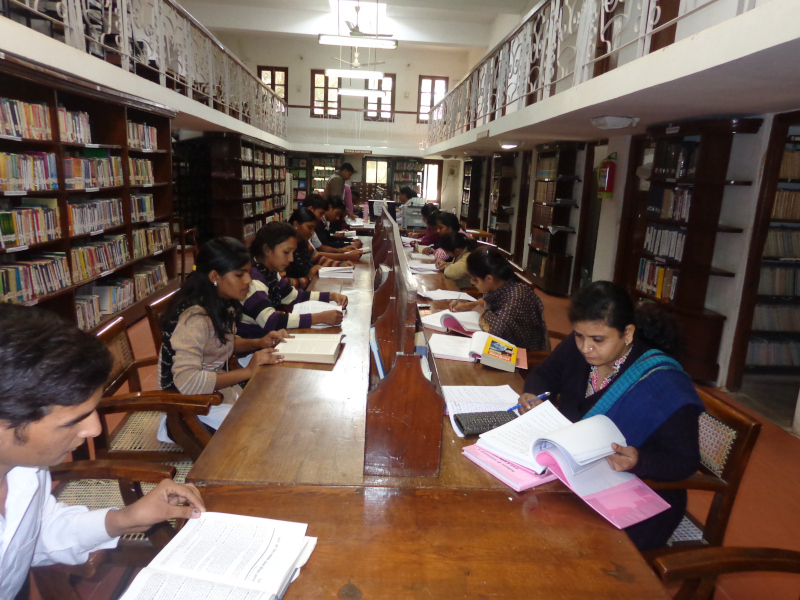
The library has a collection of over 34,000 volumes. Special facilities have been provided for research scholars. There is an open shelf system giving students immediate access to any book they may like to read. The library has established a book-bank which has a rich and varied collection of books. A set of six text-books covering the course is provided to each student. The college has a separate library block with an extension block constructed with the financial assistance from U.G.C.
Total no. of books – 35037
National Journals – 64
International Journals – 6
News Letters
Book Bank
Encyclopedia – 42
Ph.D Theses – 208
Project Reports
News Papers and Magazine
E-Library
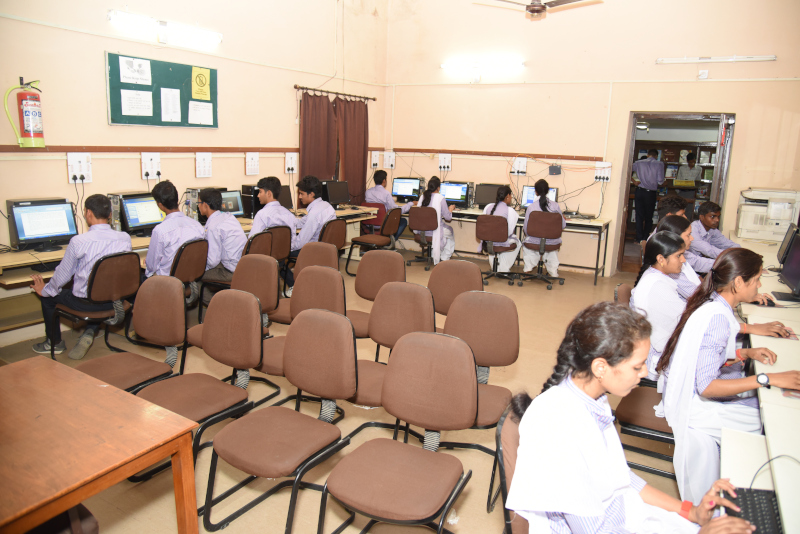
Attached to the Liberary is E- Liberary ,which has thirteen Computer systems each having the facility of network surfing and access to E Journals. E liberary has a subscription to three E- Journals .The E Liberary has the capacity of 30 Seatings at a time.
Smart Classes
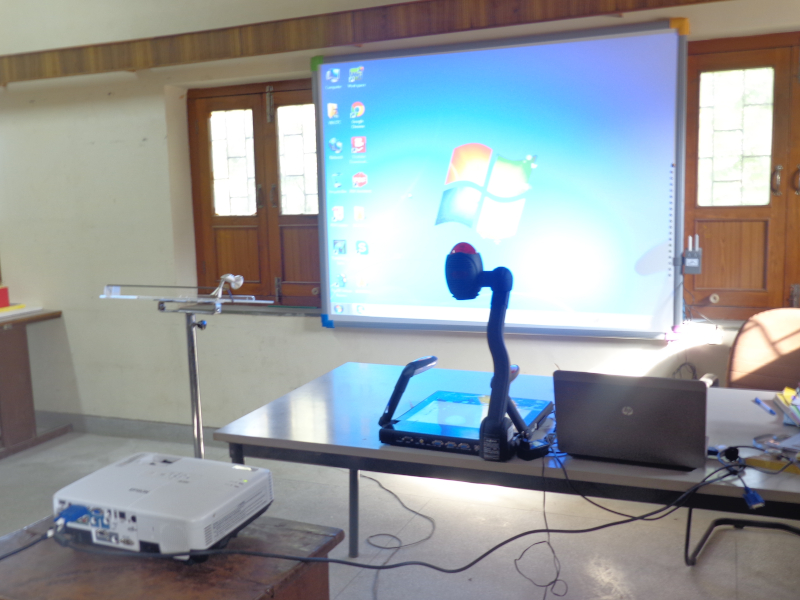
- The college campus has Smart Class rooms equipped with Smart Boards, LCD Projector, LCD Screen, Visualisor and Interactive Penal.
- These class rooms provide a Learning atmosphere where Students are exposed to on- line Live Experiences to various Content.
- The student enjoys the Interactive atmosphere and their curiosity is risen, so the attainment of objectives becomes fast and long lasting.
Laboratories
The College has separate laboratories for Computer, Language, Psychology, AV & ET Lab, Mathematics, Science, Music and Social Science. All laboratories are well equipped to meet the requirements of teaching and learning as per the syllabus.
Computer Science Laboratories
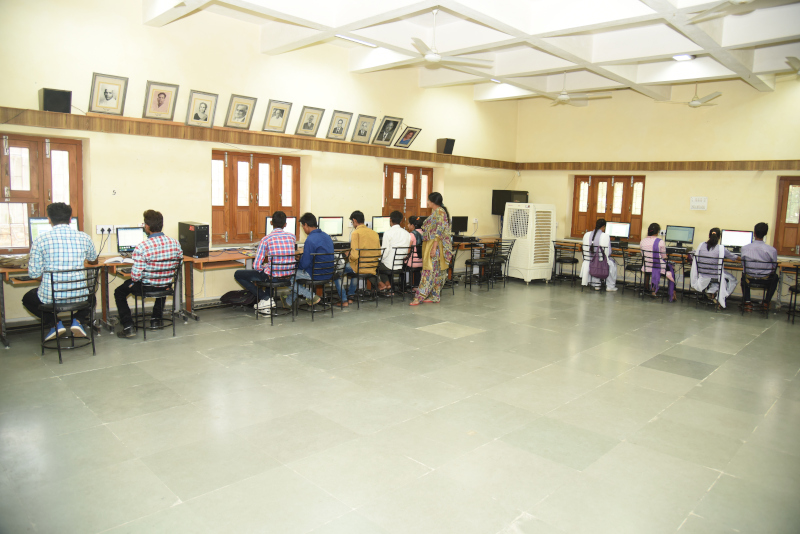
Fully furnished Computer Science Lab have 30 computers with peripherals like Hi-DPI scanners, printers and projectors. The College has internet with Wi-Fi facility.
Language Lab
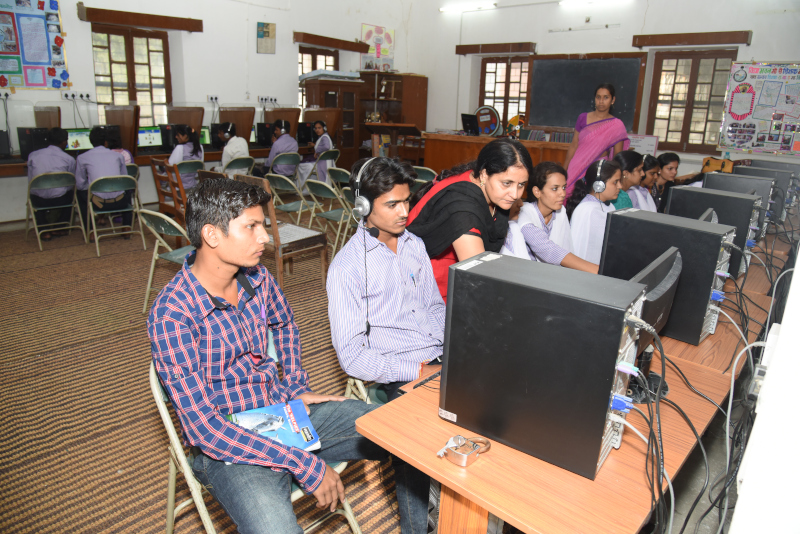
- The college has a sophisticated and versatile Digital language lab.
- It is a twelve-booth lab which has great potential.
- It is an asset in teacher education programmes and enables trainees to assimilate language, internalize it and develop real communicative competence through plentiful exposure to the skills of listening and speaking.
- The laboratory is mainly used for the benefit of the trainees who have offered a language as a teaching subject at the B.Ed. and M.Ed. levels. It is also used by in-service teachers during their training programme.
Psychology Lab
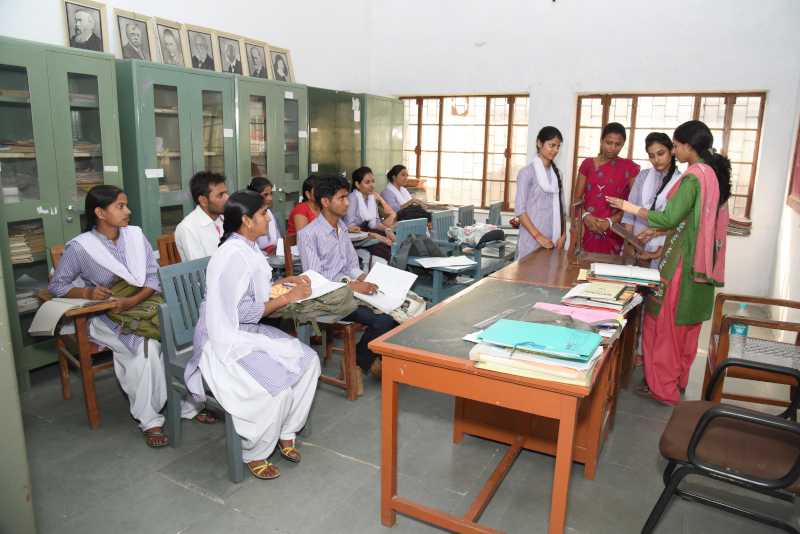
- Attached to the college is a psychology laboratory equipped with various psychological tests (verbal and non-verbal and performance), apparatus for testing and guidance.
- The student teachers have the benefit of receiving training in testing and guidance. Testing services are also made available to other educational institutions, research scholar and in-service teacher trainees.
Educational Technology Lab
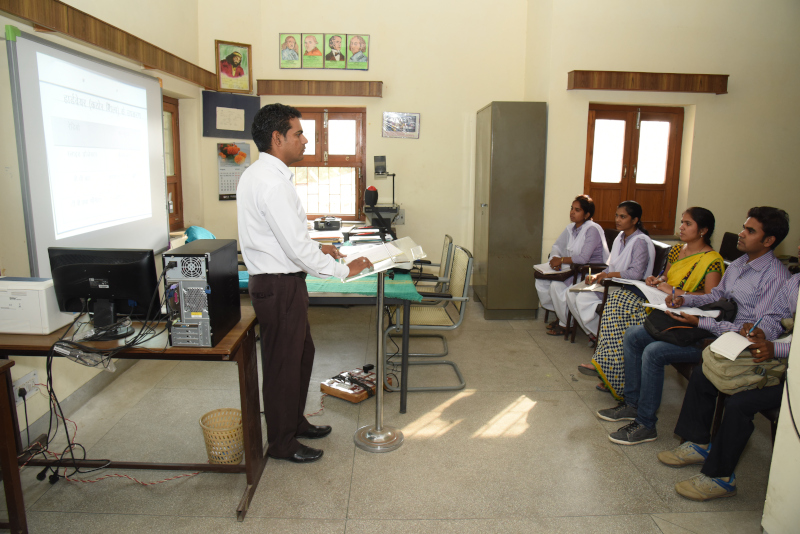
This lab provides necessary teaching audio-visual aids to the candidates under training for the purpose of demonstration and Teaching Practice in schools.
Mathematics Lab
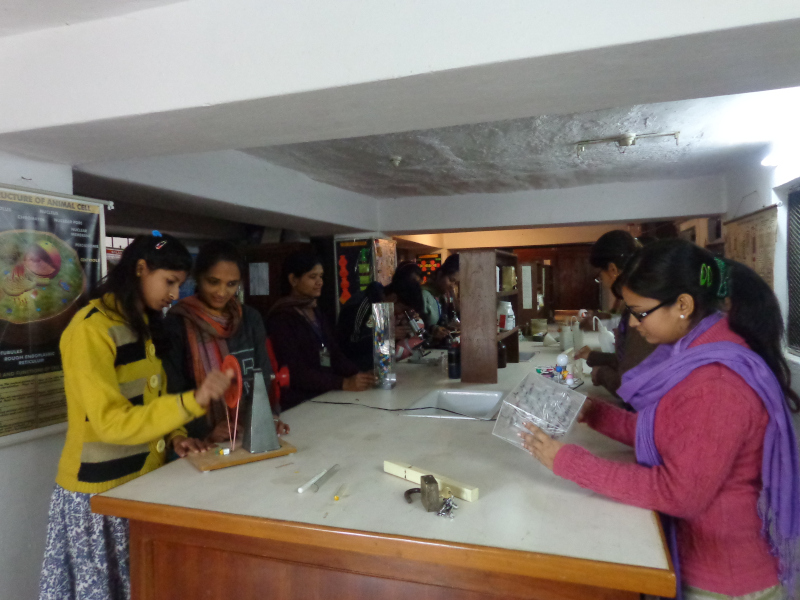
To give practical training in Mathematics to student- teachers and in-service- teachers a well-equipped mathematics lab functioning in the Institute.
Science Lab
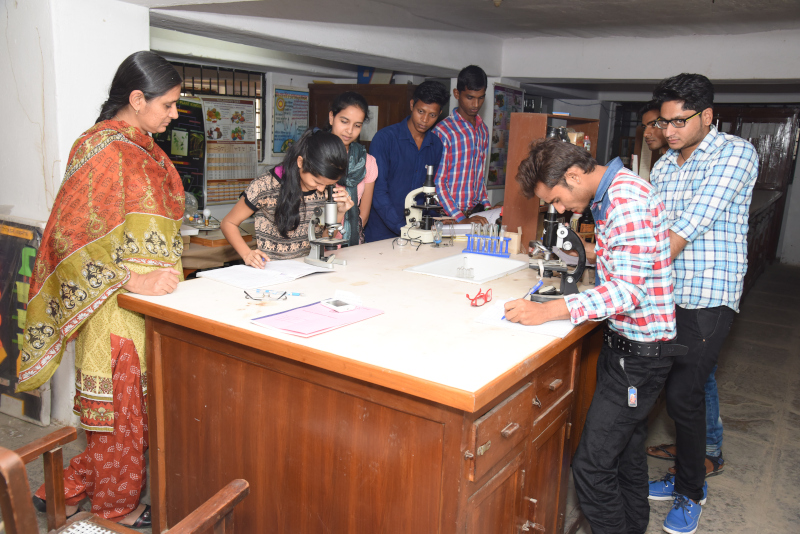
The science lab in the Institute is reasonably equipped. Students can work in the lab during their practical classes and get essential materials for teaching practice. The lab is also used during in-service education programmes.
Music Room
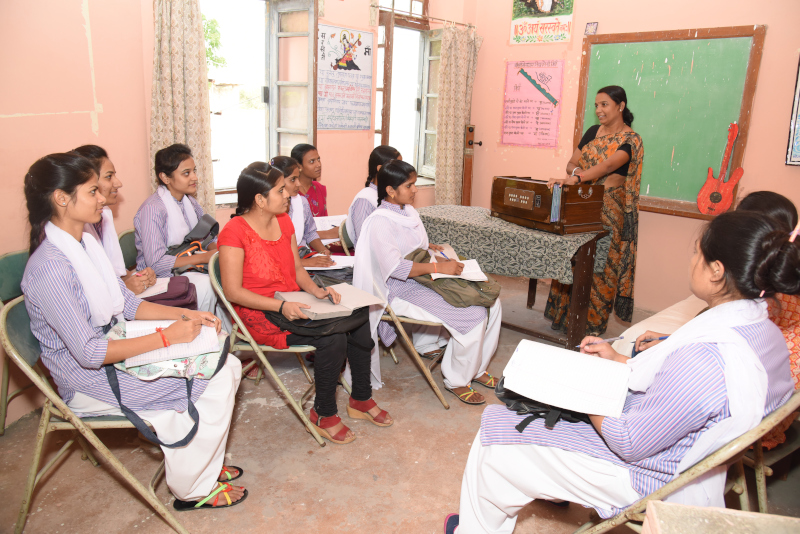
Keeping in view the all round development of the students there is a music room with necessary musical instruments in the Institute. Students have practice in different aspects of music and teaching of music.
Social Science
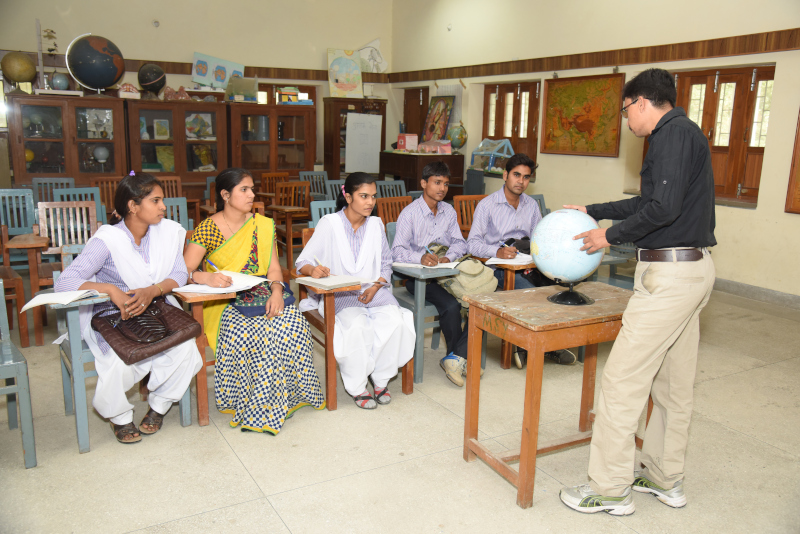
The college has a Social Science laboratory which has the facility of arranging Workshops on Social Issues. The laboratory is equipped with Charts , reference materials, Transparencies ,C.D, Flax ,books on issues and challenges of recent society.
Geography & Environment Section
The Institute has a Geography & Environment lab which is equipped from the point of view of practical work, demonstrations, outdoor activities and cartographical exercises to be undertaken by the students.
History Section
The college has a well furnished History laboratory. This laboratory is equipped with various teaching aids related with world and Indian History . Maps on Historical development, Poster of historical Figures ,Time line of eminent historical reigns, transparencies and reference materials are available in the laboratory. This Laboratory is Used for arranging History Classes for Inservice and preservice Training programmes.
Multi Purpose Hall
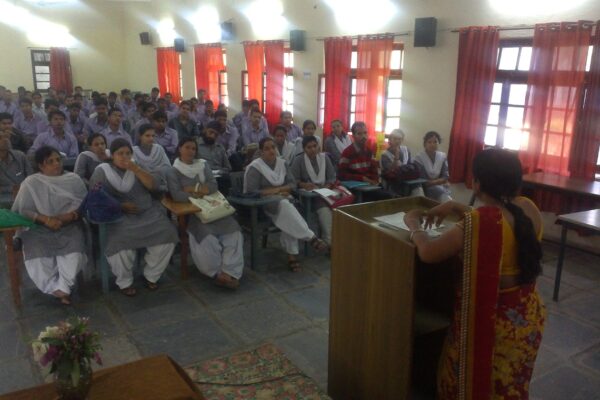
- In campus, the college has a hall with a capacity of 300 seats.
- The hall provides multi-facet facilities for organizing seminars, workshops and lecture series.
- The hall is well ventilated and equipped with technological inputs of amplifier, smart board, LCD projector and a stage.
- This hall is used as a venue for various in-house and inter-college educational get-together activities.
Conference Hall
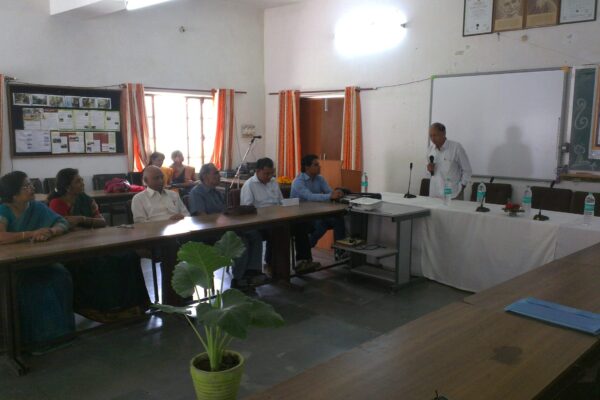
-
The college has a well furnished conference hall having the facility of a seminar table and a seating capacity of 150 delegates.
Auditorium
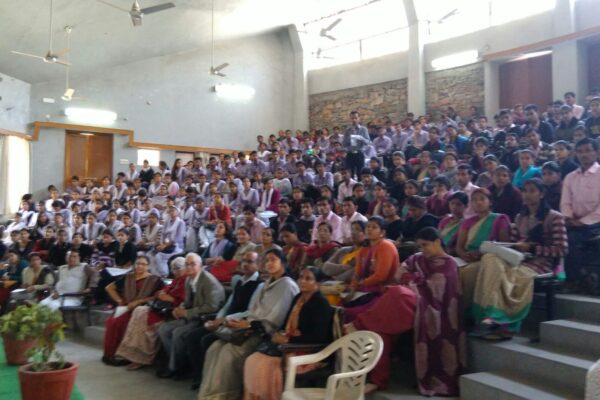
- The auditorium of the Institute was constructed in the year 1996-97 with the financial assistance from the MHRD.
- The hall is used for conducting in-service education programmes such as conferences, seminars, workshops, etc.
- It has a seating capacity for 350 persons.
Play Grounds and Games Facilities
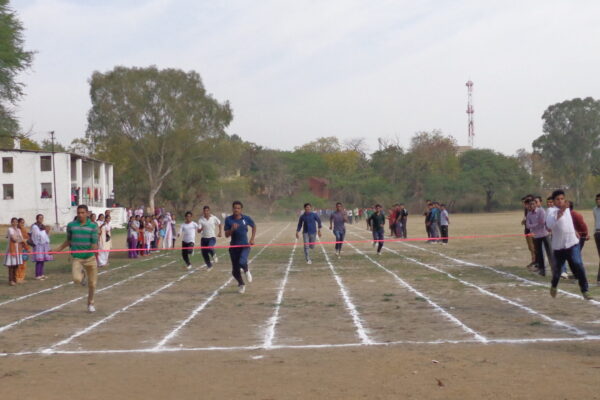
- The College has its own play grounds for volley ball and basket ball.
- Indoor games facilities for badminton and table tennis are available.
- Annual sports meet provides opportunities for participation in sports with major aim of giving exposure in organizing sports activities.
Hostel
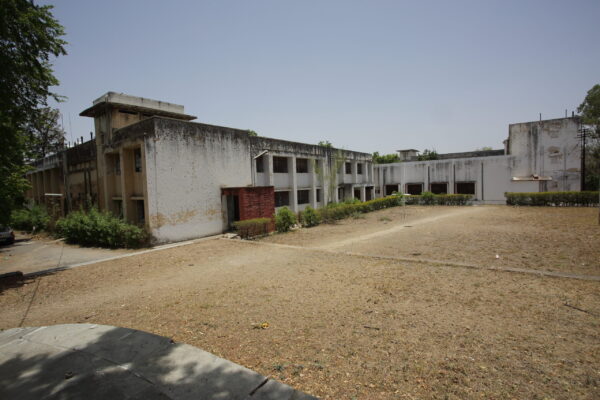
- The college has three hostels- Boys, Girls, In-service hostel
- Boys Hostel -A three-storeyed hostel with accommodation for 250 students is available. The foundation stone of the hostel building was laid on March 31, 1954 by Pandit Jawaharlal Nehru, the then Prime Minister of India.
- Girls Hostel- There is a separate hostel for female students with accommodation for 300 students.
- Another hostel having 52 rooms is meant for in-service teachers.
Annpurna Mess
- ‘Annapurna’, the Cafeteria of the institute provides tea, coffee and meals at a reasonable price.
- It has a prominent place in the campus.
Water Recycling System
- The institution also has a unique system of water recycling.
- Waste water of the drains is used for gardens after treating.
Solar Water System
-
The college has a facility of the solar water system. The roof of the hostels and college building has solar panels which heats the water stored on the roof tanks providing hot water circulation round the clock. This is a novel source of e generating energy and saving electricity.
Security
- • The college has 24-hour security system where guards are deputed in the campus and hostels.
- They check the people coming to the campus and guards the building against any ill happenings.
Fire Extinguisher
- In the college building fire extinguisher system is installed.
- Portable fire extinguishers are installed in rooms of the corridor.
- In case of any causality these extinguishers are easily available to avoid any kind of harm caused by fire.
Free Wi-Fi
- The college campus furnished by free Wi-Fi facility.
- Student and faculty get the benefit of free network surfing during the working hours.
- Four Routers are installed in the campus.
24 hrs Power Supply
- The campus has the facility of an uninterrupted power supply.
- Every room has an inverter facility.
- 2 KV generator is installed which provide electricity at times of larger power cut.
Parking
- The college has a parking facility at the right side of the front corridor.
- This parking has a capacity of housing 50 two-wheeler and 20 four-wheelers.
Garden
- This is a beautiful facility available in the college campus.
- Where the entrance and front part of the college campus is beautiful with large garden having various botanical species of flowers and tall trees.
- This provide natural and soothing surrounding.
Medical Facilities
- The college has First Aid Medical Facilities available.
- Yearly Health Check Up camps are organized.
- Yearly Blood Donation camps are organized.
Clubs
To carry out various literary and co curricular activities in diverse subjects, the college has many clubs which have well furnished infrastructure facilities. It organizes activities related to the subject specific demands. The college has following clubs-
Science Club
- The science club is organized by the faculty of science and the students of science stream.
- This club carries the activities related to science awareness and development of scientific attitude among the students and society at large.
- The club organizes science fair, science excursion and social awareness programmes related to science and its sustenance for future.
Geography Club
- The geography club is created by the faculty of Geography and the students of Geography.
- This club functions and organizes activities related to the aptitude and awareness of the main areas of Geographic concern.
- It organizes excursions and researches in the field of geography.
Environment Club
- Environment club is the platform to organize environmental projects and maintain botanical garden in the college.
- The faculty of life sciences and biology students are the members of this club.
- The club also organizes awareness campaign for environmental issues against population and sustainable future.
Social Science Club
- Members of this club are the faculty and the students of Social Science.
- This club organizes rallies and mass awareness campaigns for social issues in order to develop exposures of the society with reference to gender sensitivity, social responsibilities and social ill/ rituals.
Subjects Societies
- The B.Ed. and M.Ed. students of the college are divided into various subject societies.
- Under this society head various literary and cultural competitions are organized throughout the year.
- In all there are 10 societies of respective subjects- English, Sanskrit, Science, Social Science, History, Geography, Hindi, Economics, Commerce, Political Science and M.Ed. society.
- Activities in open air sessions and games events are also organized under these society heads.
- This is a platform for developing intra college competitive spirit and also it generates administrative and leadership qualities within the students.
Support Service Cells
Open Air Session Camp
(Environmental Awareness and Community Service Camp)
- In order to develop in the student-teachers a social outlook and to awaken their interest in environment and social welfare, a one week’s Open-Air-Session camp is organized by the college at a suitable place.
- Study projects and surveys are undertaken and the students complete them under the guidance of the members of the staff.
- On the last day they present their work in the form of an exhibition.
- There is a special stress on community living (learning to live together), community service and community education.
- All the students and faculty members, except the Ph.D. scholars are required to attend the OAS Camp.
- During the Camp the student teachers also learn how to use environmental resources for classroom teaching purposes.
- The major aim of the OAS camp is to develop organizational skills in them.
- It is a unique feature of the college which has been adopted by many universities and colleges.
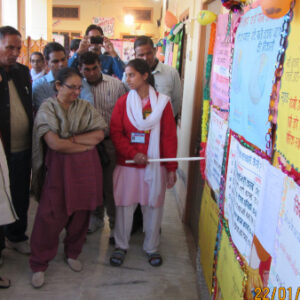
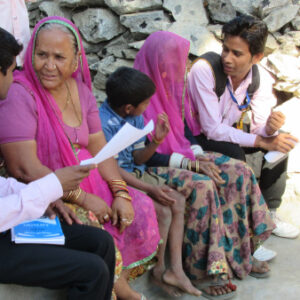
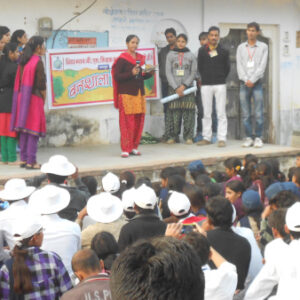
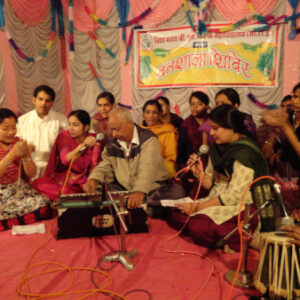
Internship
- The college organizes a two-week internship programme for the candidates of the B.Ed. course.
- The teachers under training are divided into suitable groups for whole-time work in practicing schools as regular teachers under the joint guidance of the headmaster concerned and two members of the teaching staff.
- Some schools outside Udaipur are contacted and selected for internship programe every year.
- This practice is designed to make the programme of teacher education more realistic.
- This programme helps the students teachers in understanding school system and the community.
Alumni Association
- Snatak Parishad an alumni Association, is a distinguished feature of this Institution.
- Students of B.Ed./ M.Ed./ Ph.D. courses are the life members of this association and most of them today are in prestigious positions in different educational and other organizations.
- The Parishad functions through its democratically elected executive and the Principal of the Institute is its patron.
- It has been functioning since 1970.
- The major activities undertaken by this association are-
-
- Organization of annual get- to-gather meet.
- Organization of Dr. Shreedhar Nath Mukhrjee debate competition.
- Organization of Dr.Panna Lal Shreemali lecturer series.
- Sharing of thoughts and discussion on the new avenues of institution growth.
- Publication of the new ideas and thoughts of the old alumni members.
This association of the old students aims at building a social bridge between the present, past and future educational perspectives.
Student Council
Student’s Council
- There is a Student’s Council the membership of which is obligatory for all candidates.
- The aim of the Council is to provide a means of social interaction among its members and to help them in their difficulties in connection with their studies in the college.
Group System
- The students are divided into groups according to the special subjects offered by them with the faculty members concerned as the advisers.
- Each group has its own President and Secretary and organizes academic, social and cultural programmes in consultation with its adviser.
- The programmes include hikes, picnics and visits to places of importance, lectures, paper-reading, debates, etc.
- This gives the members of the group an opportunity to come in professionally and academically close contact with one another and with the advisors who help them.
Tutorial Groups
- Teachers under training are divided into small groups for tutorial work.
- In these groups they discuss their difficulties with regard to their work in theory and practice,
- They present papers and receive individual help and guidance in their studies and personal problems.
S. N. Mukherji State Level Debate for Teachers Colleges
- In order to keep in touch with other teachers colleges of Rajasthan ,an Inter-Teachers College State Level Debate Competition is organized every year.
- Two running trophies, donated by Dr. S.N.Mukherji, and individual prizes are given to outstanding participants.
- The first competition was organised in the year 1969-70.
- The competition is organized with the joint collaboration of JRN university Dabok
Shri P. L. Shrimali Memorial Lectures
-
To commemorate late Shri P.L. Shrimali, an alumnus of Vidya Bhawan School and former Principal of Vidya Bhawan Teachers College, a prominent educationist of the country is invited to give a series of two lectures every year under the auspices of Snatak Parishad. It was started in 1975-76.
Personality Development Camp
- As the Board of Secondary Education Rajasthan wanted to launch a Programme for personality development of meritorious students, Vidya Bhawan CTE was entrusted with the responsibility of conceiving, planning and executing a programme in this direction.
- After several meetings with the faculty and other experts a six days personality development camp was planned and executed in the year 2000.
- The programme aimed at helping the meritorious students in developing various aspects of their personality such as communication skills, creativity, planning and self-management, exploring and interacting with environment etc.
- This camp was immensely successful and was widely appreciated by Educationist at National and State Level. Two such camps were organized in the consecutive years to consolidate and reinforce the Idea.
- In order to disseminate the idea and implement it at the divisional level a set of guidelines was prepared and resource persons were suitably trained for organizing such camps by the institutions. 6Thereafter, the programme was handed over to Rajasthan Board of Secondary Education to organize it at divisional head quarters every year.
- The faculty of the Institution has been cooperating with the organizing agencies since then.
- Presently Personality Development Camp On regular basis are organized in the college for B.Ed and M.Ed students in joint collaboration with Secure Meters Udaipur
Financial Support
Govt
-
- For facilitating the education of minority section of the society the government of India sponsors the education of B.Ed Students of SC ,ST and OBC .
- The Social Welfare Department of the Government Reimburse the fees of these Students.
- For this Facility the college provides the Procedural Help and the students gets this work done by the help of the office staff.
Institutional (Ram Chandra Ramesh Chandra Smriti Kalyan Kosh)
- Ram Chandra and Ramesh Chandra were two B.Ed. students of this college who unfortunately died during their training in the sessions 1970-71 and 1974-75 respectively.
- Ram Chandra Kalyan Kosh was established in 1970-71 by the fund raised by the students and staff at that time to help the family of Sh.Ram chandra.Similarly,in the session 1974-75
- Another kosh was founded for helping the family of Sh.Ramesh Chandra. In the year 1981-82 4 Both the Kosh were merged into ‘Ram Chandra Ramesh Chandra Smriti Kalyan Kosh’.
- The kosh helps financially the poor candidates and awards scholarships to poor and deserving B.Ed. and M.Ed.
- This kosh is managed by a committee constituted by students and staff representatives.
- Principal of the college is patron and staff secretory works as honorary secratory of this kosh.
Scholarships
The following scholarships are awarded to deserving B.Ed. and M.Ed. students:
- Sir Vijay Raghvacharya Scholarship is given to an ablest B.Ed. student for general proficiency both in theoretical and practical work.
- Sir Mirza Ismail Scholarship is given to a poor but deserving B.Ed. student.
- Shri P.L. Shrimali Scholarship is awarded to an able M.Ed./B.Ed. student for general proficiency in studies at the College.
- the Shri P.K. Srivastava Scholarship is awarded to a female B.Ed. student exclusively on the merit basis.
- Six scholarships from Ram Chandra Ramesh Chandra Kalyan Kosh are awarded to M.Ed. and B.Ed. students, out of which two are earmarked : one for M.Ed. student and the other for B.Ed. female student.
Freeships
There is a provision for freeship also subject to the approval by the president, Vidya Bhawan Society
Expertise Available
The Faculty of the college Expertise on Various issues and prospects of Education. The details of their field are as:
Mobile Library
- The college has the facility of Mobile Library.
- At Regular interval this Library visits the slum areas
- It provides learning opportunities to the needy and the deprived sector of the society.
IGNOU Study Centre
- The college is the centre for IGNOU B.ED
- Yearly Induction Programme and Workshop are organised in the college.
Student Portfolio
- Under the tutorial group portfolio of student are maintained in which the detail of each students are maintainedThe following details are maintained
- Overall Credentials
- Achievements
- Leave Applications
- Other special Achievement and requirements
Personal Guidance to each student are provided .
Vidya Bhawan G.S. Teachers College (CTE)
(Run & Managed by Vidya Bhawan Society)
- 0294-2451814
- vbcteudr@gmail.com
- https://vidyabhawan.in/vidya-bhawan-govindram-seksaria-teacher-college
- Dr. Mohan Singh Mehta Marg, Dewali, Udaipur (Rajasthan), India
Enquiry Form:
Anti ragging Cell
- As per the verdict of Supreme court of India the college has established an anti ragging Cell.
- This Cell checks the incidences of any case of ragging and ensures the establishment of discipline in the campus.
- A committee of faculty members look after every behaviour of the students and guide them from time to time.
Anti Sexual Harassment Cell
- In compliance with the Vishakha guide line of the government of India the college has a committee for Anti Sexual Harassment which looks after any case of sexual harassment of the students.
- The committee ensures the non occurrences of any such incidence through organizing orientation talks and making the students fill an oath paper regarding not showing any such behavior.
Women Cell
- To check any incidence of women Harassment at work place
- The women cell organizes orientation workshops on issues of legal provisions available to the stake holders regarding various prospects of such incidences.
Placement Cell
The Placement Cell has been functioning since July 2007. The Placement Cell of the college was established with the purpose of giving opportunity to the students of getting the best Jobs just after the complication of their courses.
The major activities undertaken by this cell are-
- Organization of Campus interview.
- Invitation to the renowned educational institutions for campus interview.
- The placement cell provides the best hospitality for the visiting schools.
- It plays a very important keynote in guidance and counseling to the students of the college for successful career placement.
- Resource persons are called for personality development.
- The aim of this division is to equip every student with all necessary skills for performing well in workplace and to provide equality work.
- Provides data base of the pass outs to the other educational institutes on demands.
- Exhibits various vacancy advertisement from the national news papers on the notice board for information to students.
Effective functioning of various careers building measures are aimed at and efforts for excellence and no compromise for quality in our placement cell is followed. The learner-centered teacher education dictate perfect campus recruitment naturally.
Grievance Redressal Cell (GRC)
- A special Cell known as ‘Grievance Redressal Cell (GRC)’ has been established in the college.
- The GRC is expected to look into the matters related to grievances of the students and faculty members, including grievances and complaints if any related to the female students, faculty members and workers of the college.
Guidance and Counseling Cell
- To look after the needs of exceptional students the college has a well established cell of Guidance and Counseling.
- This cell organizes special guidance meeting with the students who faces adjustment problems and after detailed study of their abilities and problems a counseling session is organized.


